-
Notifications
You must be signed in to change notification settings - Fork 15
Types and Programming Languages Chapter 11 Simple Extensions

We began the meeting as per tradition by admiring the variety of bread and dips provided by @urbanautomaton and @tomstuart and helping ourselves to beverages provided by @leocassarani.
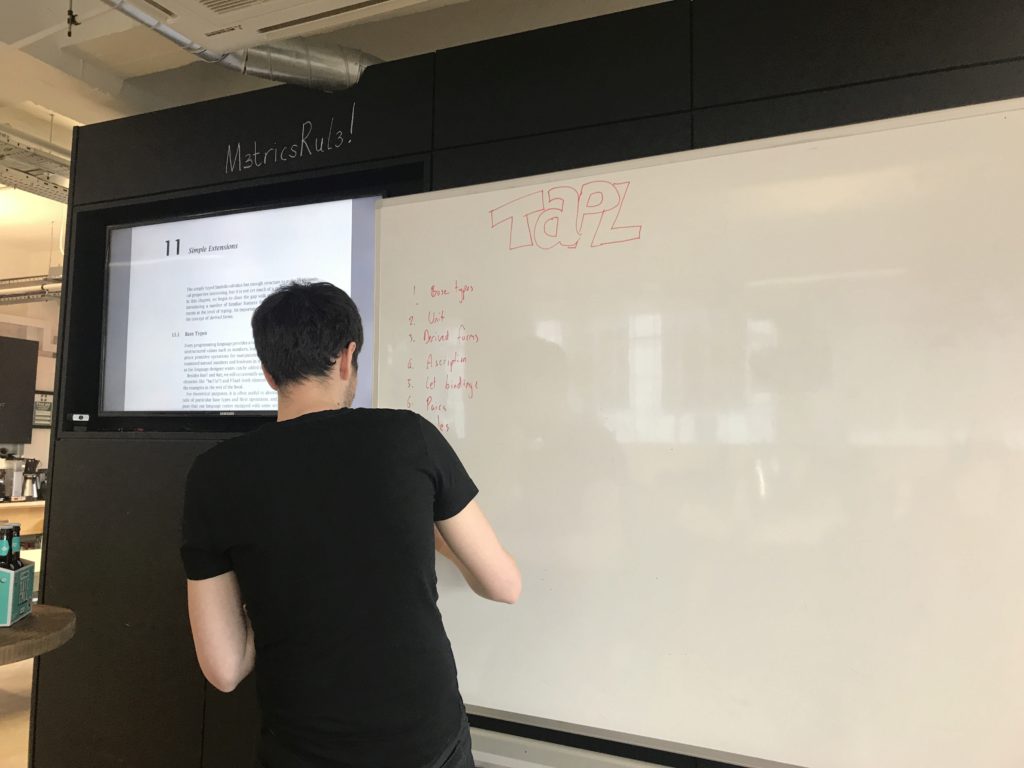
We began by listing the various sections of the chapter as a lot of us had struggled to get through it all beforehand and discussed our plan of attack for the meeting:
- Should we steam ahead, attempting to tackle as much as possible?
- Should we pick a predefined endpoint (e.g. cover up to "Pairs") and aim only for that?
- Should we pick specific sections of interest?
We decided that, as each section built atop the last and each section introduced a valuable new concept, we should steam ahead but with the full expectation that we wouldn't finish the material in a single meeting and that we may need to carry over into a second one.
We began by breezing past "base types" and onto a discussion of the new Unit type and its use in the sequencing derived form t1; t2.
We discussed the expanded version of sequencing:
t1; t2 = (λx:Unit . t2) t1
And pondered why x had to be type Unit, e.g. what if t1 returned a Bool or Nat. We assured ourselves that this would count as a type error in this language as calculating a value and not using it is pointless (particularly as we don't yet have side-effects).
We then tackled type ascription and expressed it in terms of abstraction and application:
t1 as T = (λx:T . x) t1
Which we all thought was rather nifty.
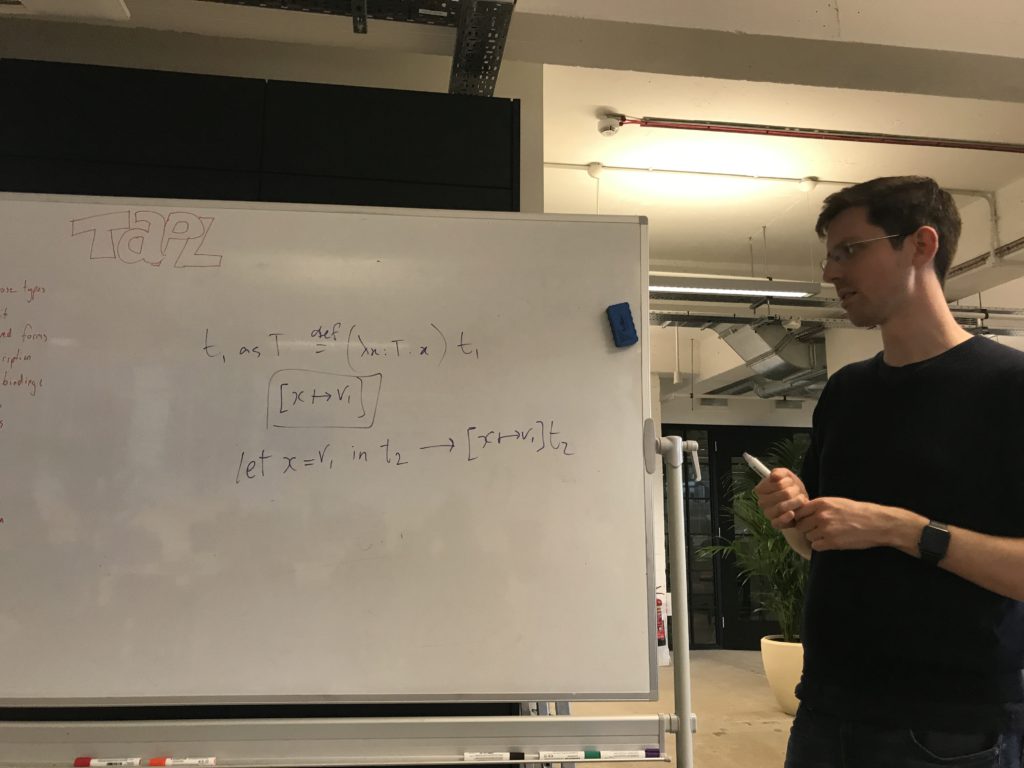
We then moved onto let and explained what it does (e.g. similar to Clojure's let) and Leo derived some typing rules for it:
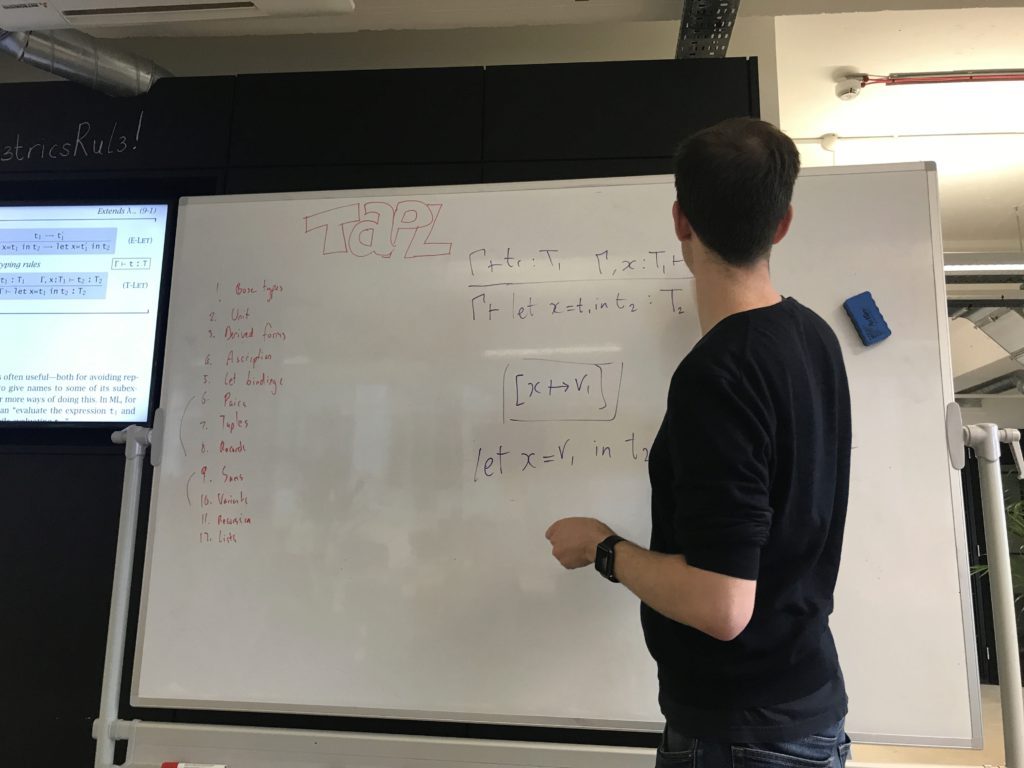
We then attempted to express let as a derived form and immediately ran into an issue:
let x=t1 in t2 = (λx:? . t2) t1
(Note that we don't know what the type of t1 and therefore x is here.)
Tom explained that this is different to the other derived forms we've seen due to this issue. We wondered whether we need to do two passes in order to expand this but Tom explained that we can think of this "desugaring" as another recursing into our type_of function which may, in turn, call our desugar and so on (like co-routines), e.g.
def type_of(term, context)
case term
when var then ...
when let then type_of(desugar(...), context)
...
end
end
def desugar(term, context)
case term
when Ascription then ...
when Let(name, term, ...) then ... type_of(term) ...
end
end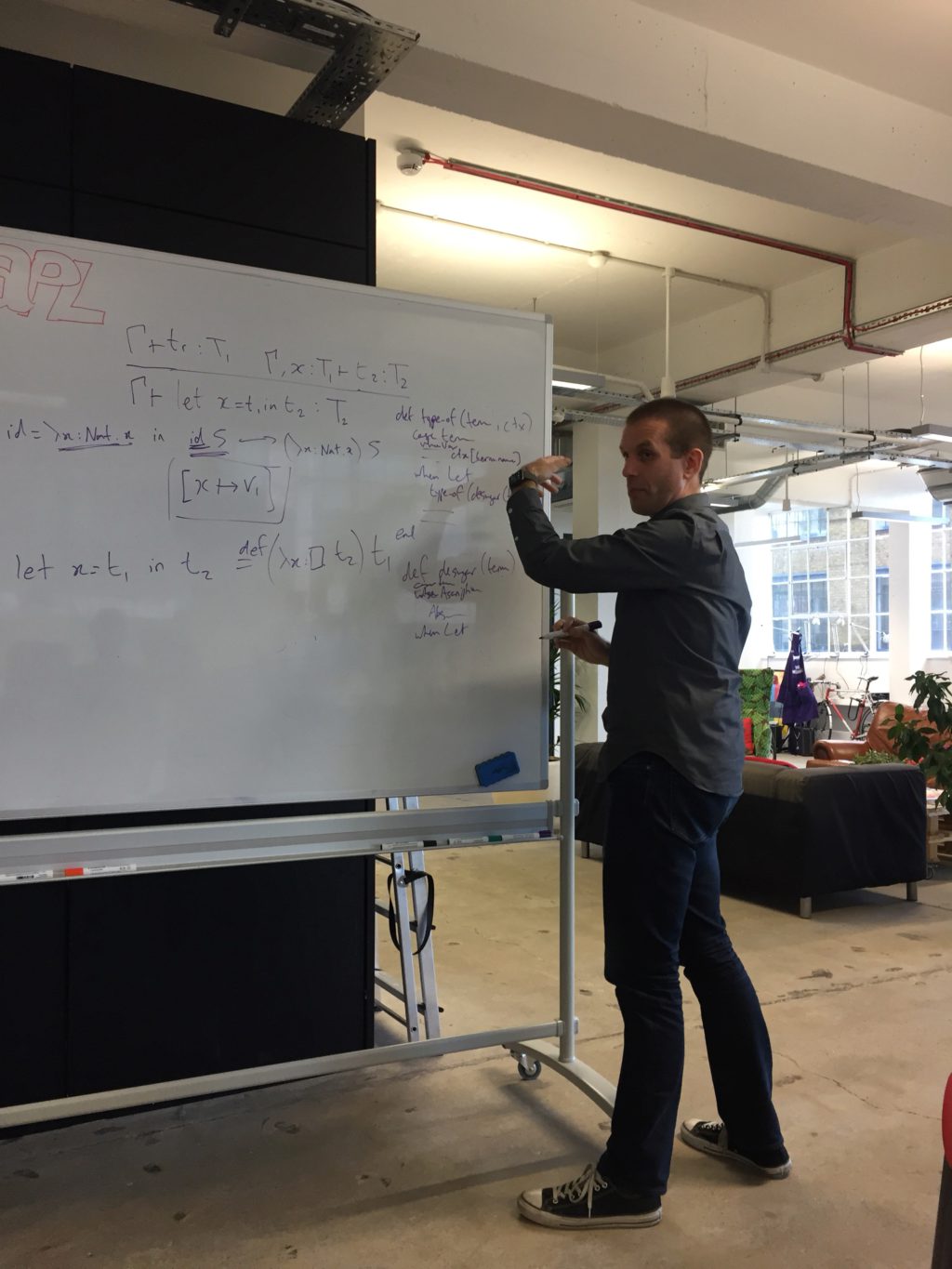
We also discussed the introduction of the "wildcard" _ in abstractions to avoid variable naming woes (where _ not only means "some name not already defined" but also that it will not be used in the abstraction body).
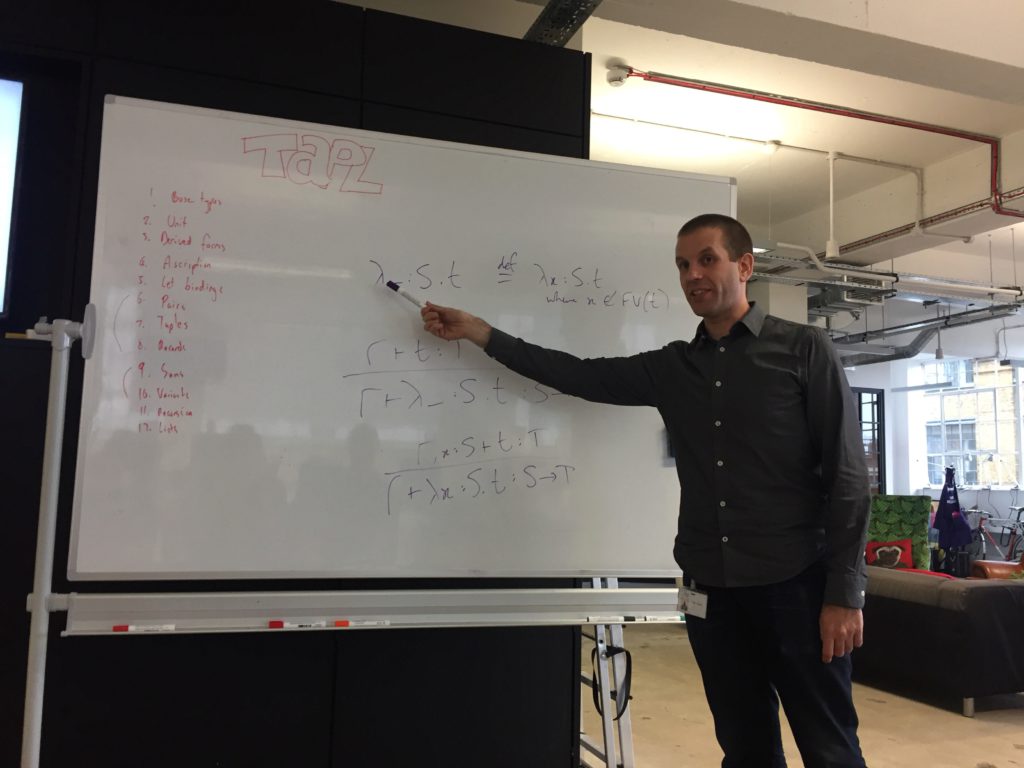
We discussed pairs with their new type of T×T and then moved onto the more general concept of tuples (building on top of pairs to have more than two elements) and then records (building on top of tuples by attaching labels to each value). We noted that projection in all of the above cases (e.g. t1.1 or t1.5 or t1.name) is defined as static and is not dynamic, that is the 1 in t1.1 is not some Nat term but part of the language itself.
We discussed whether we could define a function to do a sort of "dynamic projection" which led us neatly onto sums: a type that represents two different types:
Nat+Bool = a Nat or a Bool
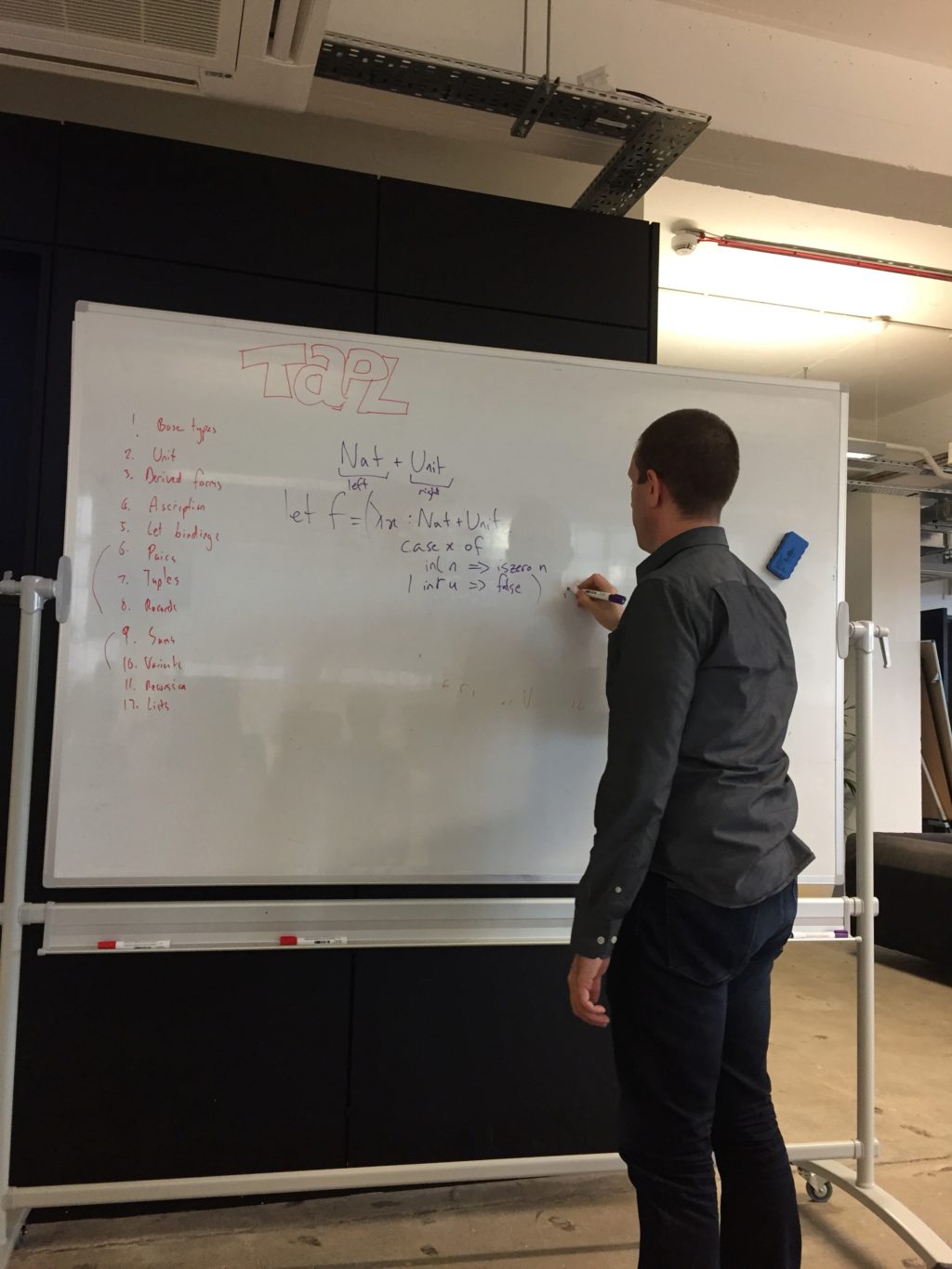
We discussed how this necessitates the introduction of the new inl and inr operators which are used to both pattern match specific types out of a sum type with case and to introduce an instance of a sum type by populating a particular side (hence inl "in left" and inr "in right"):
inl 0 => Nat+Bool
inr false => Nat+Bool
case x of
inl n => ...
| inr b => ...
We immediately wondered how we could infer which sum type a use of inl or inr would result in (e.g. what if your program has Nat+Bool and Bool+Bool, what type does inr zero have?) Feeling smug, we then realised this was the very next part of the chapter and that while we will revisit this later in the book, for now we can use ascription to state the type unambiguously:
inl 0 as Nat+Bool
inr false as Nat+Bool
Now armed with enough type knowledge, we wrote a project function which could dynamically give us a 0-indexed projection of a pair of type Nat×Bool:
let project = λp:Nat×Bool . λn:Nat . if iszero n then inl p.1 as Nat+Bool
else inr p.2 as Nat+Bool

We were pretty pleased with the type of our project function:
Nat×Bool → Nat → Nat+Bool

With time running out, we discussed the concept of variants as an extension of sum types (not unlike how tuples generalised to records) and Tom laboured over a worked example on the whiteboard:
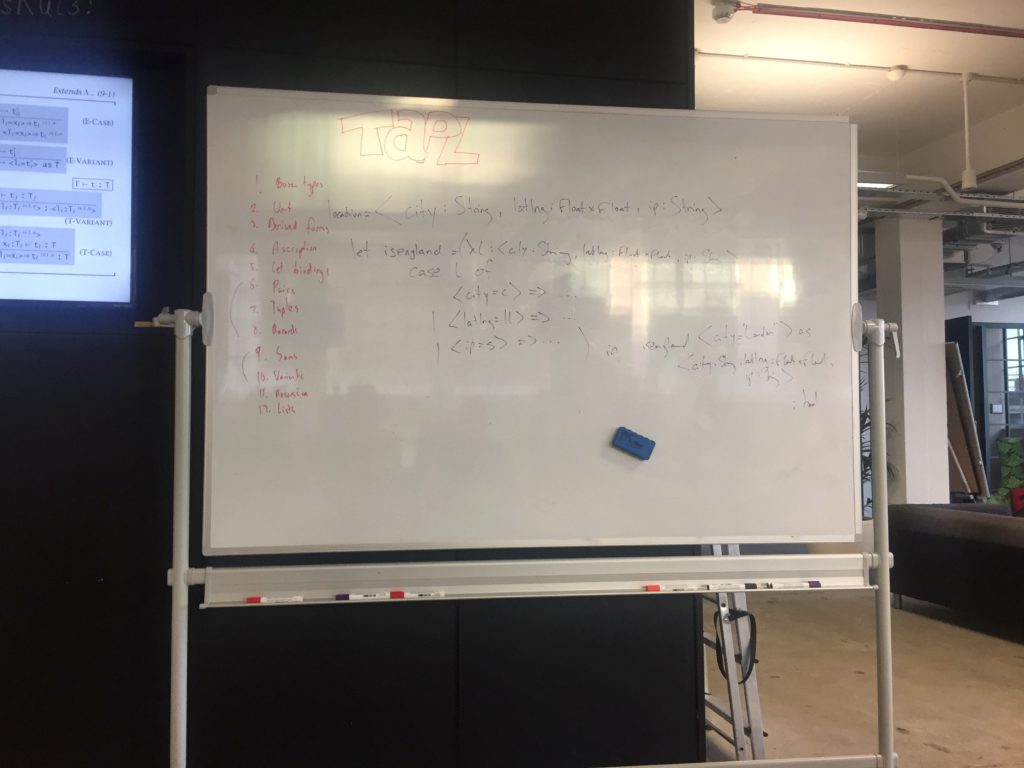
And with that, we were out of time with two sections left to go (General Recursion and Lists)!
- We were pleasantly surprised how much of the chapter we had covered given our concerns before the meeting that there was too much material to get through
- There was praise for how illuminating the meeting had been
- There was feeling that this was one of the most rewarding non-implementation meetings in the book so far with one attendee going so far as to say "it was f*cking great"
- We discussed what to do next meeting and decided to tackle the remaining two sections, mob implementations of choice types (e.g. pairs, sums, etc.) and potentially have time for another Show & Tell
- A few attendees are unavailable in two weeks so we decided to hold a poll to see whether we should postpone or arrange an interstitial meeting for next time.
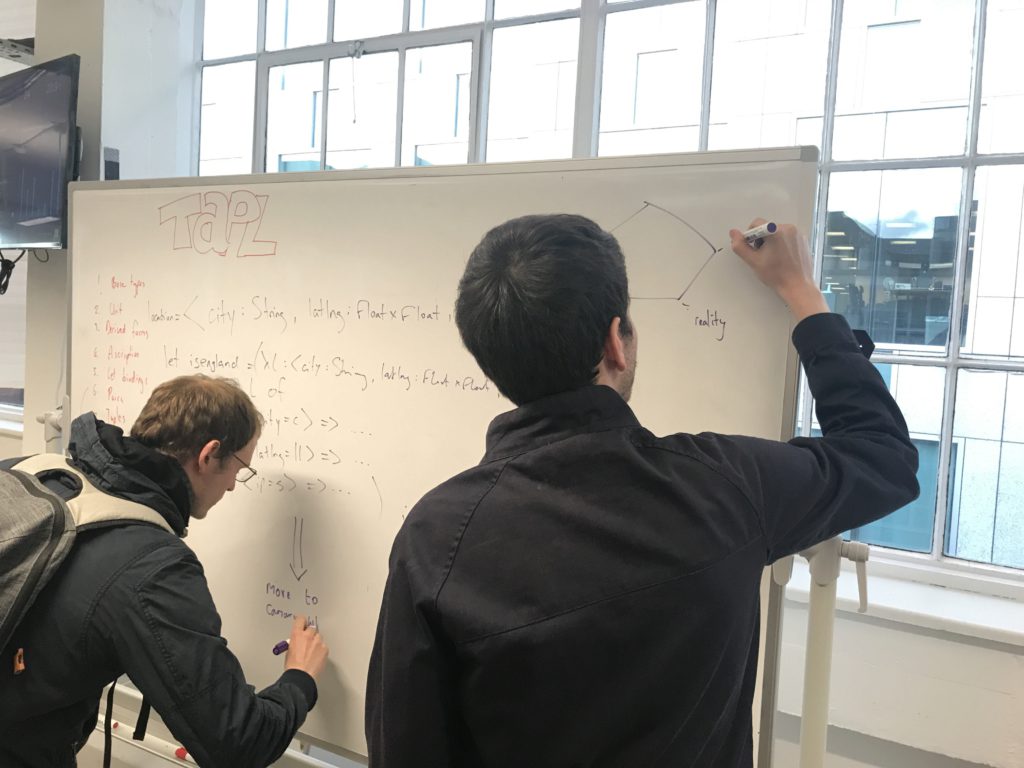
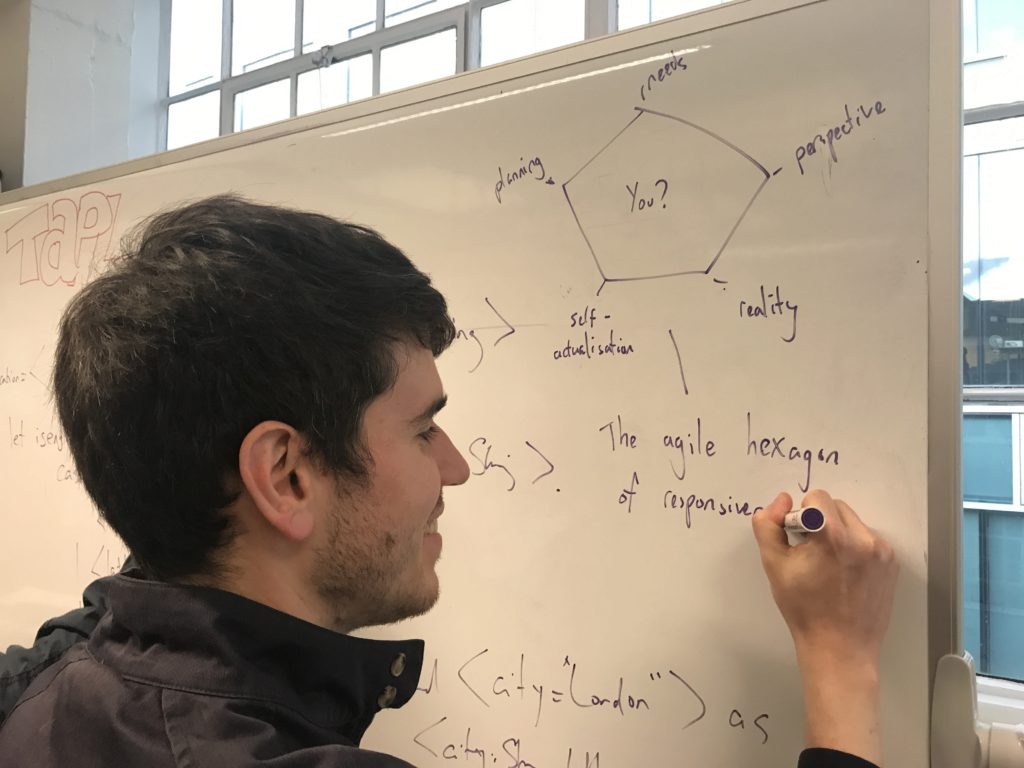
Thanks to Leo and Geckoboard for hosting and buying drinks, to Simon and Tom for buying snacks, Chris for organising the meeting and Tom for leading the discussion.
- Home
- Documentation
- Choosing a Topic
- Shows & Tells
- Miscellaneous
- Opt Art
- Reinforcement Learning: An Introduction
- 10 Technical Papers Every Programmer Should Read (At Least Twice)
- 7 More Languages in 7 Weeks
- Lua, Day 1: The Call to Adventure
- Lua, Day 2: Tables All the Way Down
- Lua, Day 3
- Factor, Day 1: Stack On, Stack Off
- Factor, Day 2: Painting the Fence
- Factor, Day 3: Balancing on a Boat
- Elm, Day 1: Handling the Basics
- Elm, Day 2: The Elm Architecture
- Elm, Day 3: The Elm Architecture
- Elixir, Day 1: Laying a Great Foundation
- Elixir, Day 2: Controlling Mutations
- Elixir, Day 3: Spawning and Respawning
- Julia, Day 1: Resistance Is Futile
- Julia, Day 2: Getting Assimilated
- Julia, Day 3: Become One With Julia
- Minikanren, Days 1-3
- Minikanren, Einstein's Puzzle
- Idris Days 1-2
- Types and Programming Languages
- Chapter 1: Introduction
- Chapter 2: Mathematical Preliminaries
- Chapter 3: Untyped Arithmetic Expressions
- Chapter 4: An ML Implementation of Arithmetic Expressions
- Chapter 5: The Untyped Lambda-Calculus
- Chapters 6 & 7: De Bruijn Indices and an ML Implementation of the Lambda-Calculus
- Chapter 8: Typed Arithmetic Expressions
- Chapter 9: The Simply-Typed Lambda Calculus
- Chapter 10: An ML Implementation of Simple Types
- Chapter 11: Simple Extensions
- Chapter 11 Redux: Simple Extensions
- Chapter 13: References
- Chapter 14: Exceptions
- Chapter 15: Subtyping – Part 1
- Chapter 15: Subtyping – Part 2
- Chapter 16: The Metatheory of Subtyping
- Chapter 16: Implementation
- Chapter 18: Case Study: Imperative Objects
- Chapter 19: Case Study: Featherweight Java
- The New Turing Omnibus
- Errata
- Chapter 11: Search Trees
- Chapter 8: Random Numbers
- Chapter 35: Sequential Sorting
- Chapter 58: Predicate Calculus
- Chapter 27: Perceptrons
- Chapter 9: Mathematical Research
- Chapter 16: Genetic Algorithms
- Chapter 37: Public Key Cryptography
- Chapter 6: Game Trees
- Chapter 5: Gödel's Theorem
- Chapter 34: Satisfiability (also featuring: Sentient)
- Chapter 44: Cellular Automata
- Chapter 47: Storing Images
- Chapter 12: Error-Correcting Codes
- Chapter 32: The Fast Fourier Transform
- Chapter 36: Neural Networks That Learn
- Chapter 41: NP-Completeness
- Chapter 55: Iteration and Recursion
- Chapter 19: Computer Vision
- Chapter 61: Searching Strings
- Chapter 66: Church's Thesis
- Chapter 52: Text Compression
- Chapter 22: Minimum spanning tree
- Chapter 64: Logic Programming
- Chapter 60: Computer Viruses
- Show & Tell
- Elements of Computing Systems
- Archived pages